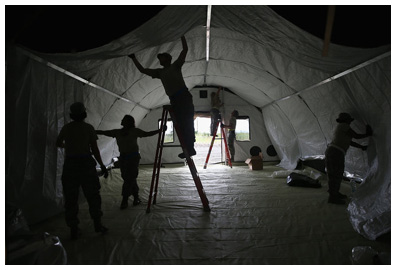US Troops Get Started with Construction of Ebola Treatment Centers
 It’s been said that the military’s purpose is two-fold: “To kill people and to break things.” But in the battle against an invisible enemy, in this case the Ebola outbreak in West Africa, United States military forces are tasked with building infrastructure that will hopefully help struggling nations contain the deadly infectious disease. Specifically, they are arriving in Monrovia, Liberia as part of a plan to build tent hospitals and train local nurses to treat a reportedly widening Ebola epidemic in Africa.
It’s been said that the military’s purpose is two-fold: “To kill people and to break things.” But in the battle against an invisible enemy, in this case the Ebola outbreak in West Africa, United States military forces are tasked with building infrastructure that will hopefully help struggling nations contain the deadly infectious disease. Specifically, they are arriving in Monrovia, Liberia as part of a plan to build tent hospitals and train local nurses to treat a reportedly widening Ebola epidemic in Africa.
The Wall Street Journal reports the troops are getting a slow start:
On Saturday, a handful of troops from the Navy's 133rd Mobile Construction Battalion led a bulldozer through thigh-high grass outside Liberia's main airport, bottles of hand sanitizer dangling from their belt loops.
They had been digging a parking lot in the East African nation of Djibouti this month when they received a call to build the first of a dozen or more tent hospitals the U.S. intends to construct in this region. The soldiers started by giving the land a downward slope for water runoff – "to keep out any unwanted reptiles," said Petty Officer Second Class Justin Holsinger.
"There is no argument the disease is out in front of the response," said Ken Isaacs, vice president of programs and government relations for Samaritan's Purse, who as an expert in humanitarian assistance is leading who is leading the relief organization's Ebola efforts in Liberia. In terms of response, he added, "where we are today is where we should have been 60 to 90 days ago."

Major General Darryl Williams, the commander of U.S. Army Africa and the leader of the advance team in Liberia, told CNN that the mandate – straight from President Obama – is different from other missions:
As Williams inspected the construction of the Monrovia Medical Unit, a facility specifically for infected health workers to be run by U.S. government health teams, a crowd of local residents monitors progress from just across the road.
"While we'll do a lot of tangible things – we'll build this hospital, we'll build the Ebola treatment units, provide these labs – there's a lot of intangible nature to this fight," he said.
"You want to give people the resilience, the hope that they can fight this thing and see this through."
His U.S. Army Africa advance team is tiny compared to the 101st Airborne that will be replacing them in the coming weeks.
More US fighting forces are on the way.
Last week in Texas, Governor Rick Perry visited with soldiers preparing to deploy to West Africa for this humanitarian mission.
Perry told soldiers at Fort Hood that their training has indeed prepared them for this kind of assignment. In a short speech to soldiers, Perry told soldiers that they will be an integral part of holding back the tide of Ebola in West Africa while this nation deals with the first confirmed case of the disease in Texas.
“When you signed up to serve the United States Army, this may not have been the role that you saw yourself playing,” Perry said. Perry, a veteran, told them that the training they’ve already been through should have gotten them ready for helping to put infrastructure in place in Ebola-stricken nations so that they can remove the threat of the disease, as he put it.
“It's the events in life that you don't see coming that really distinguishes and characterizes who you are,” Perry said. “You’re fixing to do a great service for the world.”
You can watch the 3-minute CNN video story below:




Comments
Join the discussion on Facebook
Join the discussion on Facebook.